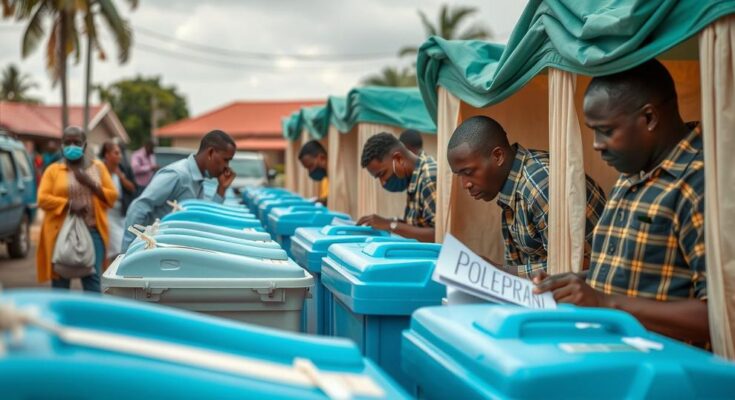Ghana’s general elections on December 7, 2024, are taking place amidst the worst economic crisis in decades. Approximately 18.7 million voters are casting ballots for a new president, with Vice President Mahamudu Bawumia of the ruling NPP facing former President John Dramani Mahama of the NDC. The elections include 276 parliamentary seats, reflecting a critical moment for Ghanaians seeking socio-economic stability in light of soaring inflation and widespread discontent about the economic situation.
On December 7, 2024, Ghanaians participated in presidential and legislative elections amid a significant economic crisis that posed challenges to democracy in the West African region. Approximately 18.7 million citizens were eligible to vote, yet the two leading candidates failed to inspire confidence for transformative change. Incumbent Vice President Mahamudu Bawumia, representing the New Patriotic Party, contended against former President John Dramani Mahama of the National Democratic Congress, who faced previous criticism for economic shortcomings during his term. Polls indicated a possible comeback for Mahama, with projections showing him at 52.2% against Bawumia’s 41.4%. The elections included 276 parliamentary positions, a slight increase over previous years, highlighting the critical involvement of Ghanaians in shaping their government amid dire economic circumstances. Throughout Accra, despite the election’s jubilant atmosphere, citizens remained acutely aware of the pressing issues plaguing their economy, which had suffered from significant inflation, debt defaults, and environmental crises due to illegal gold mining activities.
Ghana, once celebrated as a model of democratic stability and economic development in West Africa, has encountered severe economic challenges over recent years. The country now faces one of the worst economic crises in its recent history, characterized by soaring inflation rates, job scarcity, and increased living costs. Ghanaians, more than ever, are concerned about their nation’s trajectory as they prepare for elections that may determine the future direction of their country. The election’s historical context is crucial, highlighting Ghana’s transformation from a beacon of democracy to a nation grappling with economic hardships.
The elections in Ghana serve as a critical reference point for democracy within a region that has witnessed numerous upheavals. With two primary candidates offering limited variation in their platforms, the outcome will hinge on Ghanaians’ perceptions of economic management and optimism for future recovery. As voters engage in this electoral process, the focus remains on reversing the economic decline, addressing pressing social issues, and restoring faith in the government’s ability to propel the nation forward.
Original Source: apnews.com




